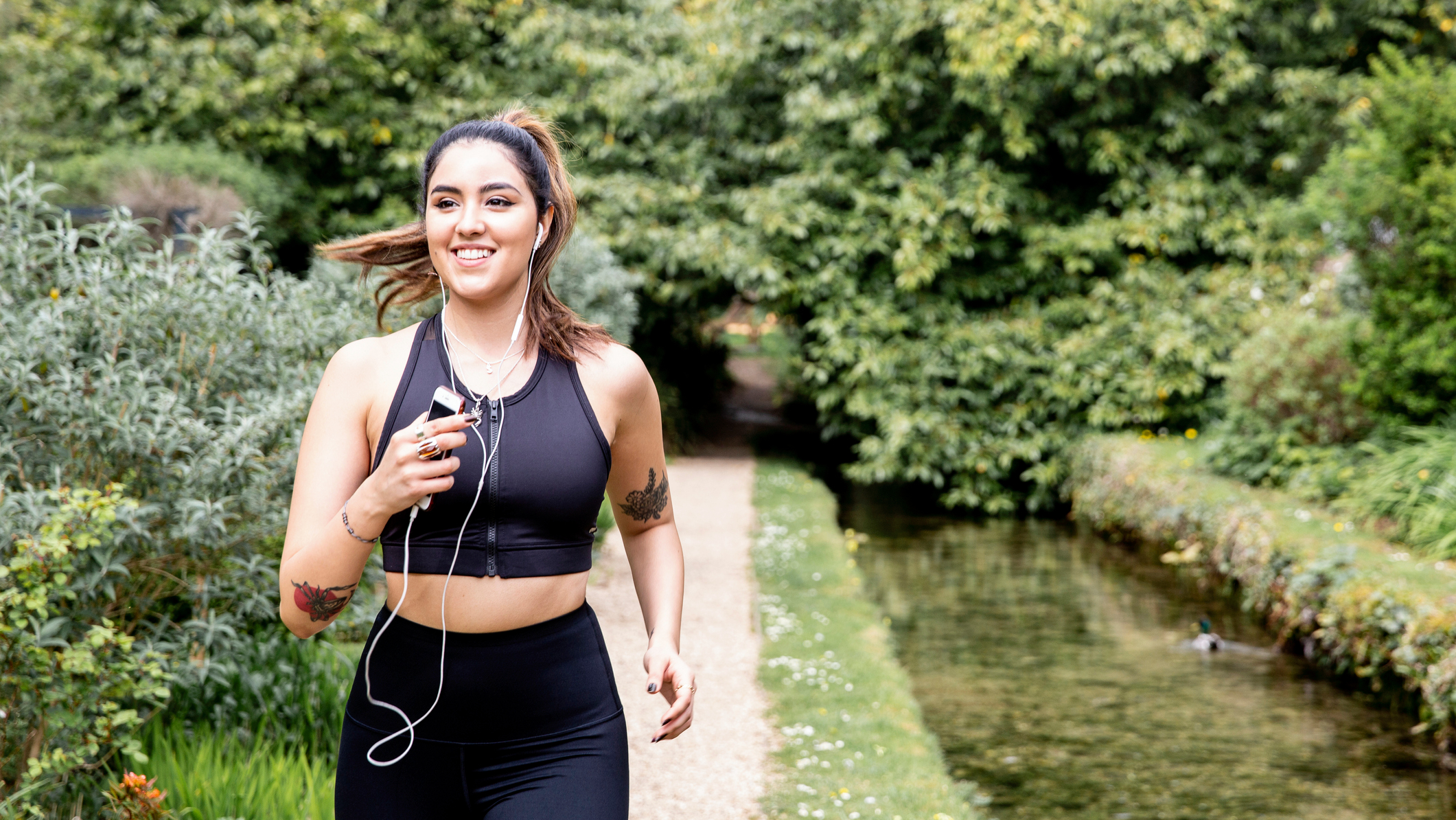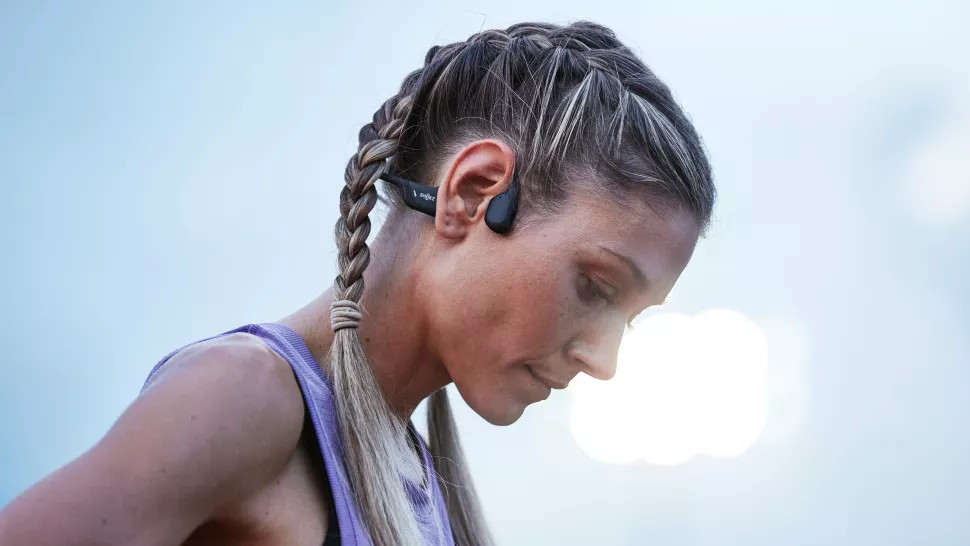Does music make you run faster? Science seems to say so
A look at the research on how music improves your running performance, and how to get started

All the latest inspiration, tips and guides to help you plan your next Advnture!
You are now subscribed
Your newsletter sign-up was successful
Whether you like to pound the pavement or scamper down the soft stuff in your trail running shoes, there’s a good chance you like to do so while listening to your favorite tunes – a full 75% of runners are pro music, according to a report in The Guardian. Your favorite number can have you feeling like you’re soaring down the trail, even after an hour of running, while running without your headphones somehow feels 10x longer than usual and your legs feel like they’re mysteriously filled with concrete. And what is that hammering sound coming from your chest? So does music make you run faster or is it all just a case of perception? We decided to look at the science to get to the bottom of this common question.

Does music make you run faster?
It turns out that there’s been a surprising amount of research done on the topic of how listening to music can impact running performance, with many scientists concluding that lining up a few bouncy little numbers before you head out really can help you pick up the pace.
Pacing yourself to the beat of music is a common strategy used in indoor cycling classes that runners can also benefit from. The technique involves syncing up your stride with the beat of the song you’re listening to. You might start out with a few songs that have a slower tempo of around 100 -120 beats per minute (bpm) and then play a few that are faster, with a bpm closer to 150 or higher. Of course, this varies for each runner and won’t do you much good if you’re a classical music nut, sorry.
Though 2020 research in the journal Sports suggests that listening to music won’t actually change your pacing strategy, it does prove to increase your overall speed and further, it reduces your blood lactate levels which means that you may be able to run for longer, increasing your endurance too.

Why do you run better with music?
So listening to music does make you run faster, but how does it work? In 2012, Professor Andy Lane from the University of Wolverhampton carried out research to understand the link between tunes and running performance and he thinks the answer is surprisingly simple. His primary findings were that listening to music helps you by creating a distraction from the effort that goes into running, known as rate of perceived exertion, so your sense of how fatigued you are goes down by as much as 12%.
The reduced feelings of fatigue and effort can actually serve to improve your motivation around running and he suggests that you should even put on some music before you even leave the house, or while you’re warming up, to help switch your brain away from the effort you know you’re about to have to muster. Once you’re out the door you’ll focus more on the beat of the music than what’s happening inside your chest cavity.
This all sounds very convincing, but what if you tend to run at the end of your long work day, or fit it in around the demands of young children? Can something as simple as a good playlist help you overcome that level of exhaustion, or does it negate the potential benefits of music? In a 2021 study, researchers at the University of Edinburgh found that listening to music helped runners who had just completed a demanding thinking task to run at the same performance level as if they were not mentally fatigued, meaning listening to music might help you overcome those end-of-the-day doldrums when the couch looks like a serious contender for the evening’s activities. If you’re really stuck between a night in and the couch, try putting on some motivational music for five minutes and see if you can change your mind.
All the latest inspiration, tips and guides to help you plan your next Advnture!
Finally, what does all this mean for you if you’re a competitive runner? Does music improve your running performance enough for it to become part of your marathon training plan?The authors of a 2015 study published in the Journal of Strength and Conditioning Research seem to think so. They had their test subjects listen to motivational music before and during 5km runs and calming music afterwards and their findings suggest you have as much as a 39% chance of improving your performance when you compete. Even better, they discovered that listening to calming music after your run can accelerate your recovery, helping you to come back better for your next race.

How to run with music
Let’s just say here that you don’t have to run with music just because it’s been shown to scientifically make you run faster. Perhaps you’re not trying to improve your running pace, or maybe you prefer the benefits of listening to natural sounds such as bird calls – after all, a 2013 study published in the Journal of Environmental Psychology found that listening to the sounds of birds helps you to recover from stress and restore mental focus. There are, of course, other motivational tools you can use, such as meditation for runners.
However, if you are keen to see how music can improve your performance, there are a couple of points to take into account before you set off. First, safety. It’s generally a good idea to make sure that you’re aware of your surroundings when you’re running, especially when you’re road running but even if you’re on a trail shared with other users like horses and mountain bikers (or bears and mountain lions). For this reason, you may want to seriously consider investing in a pair of bone conduction headphones so that you can maintain your awareness of ambient noise and stay safe.
Next up, it should come as no surprise that the music you pick matters. The music you choose should always be music that you enjoy, and it’s better if it has a beat to it that’s not too slow or fast – check out our article on how to pick the best music for running for some tips.
- Best trail running shoes: footwear for tackling technical terrain
Julia Clarke is a staff writer for Advnture.com and the author of the book Restorative Yoga for Beginners. She loves to explore mountains on foot, bike, skis and belay and then recover on the the yoga mat. Julia graduated with a degree in journalism in 2004 and spent eight years working as a radio presenter in Kansas City, Vermont, Boston and New York City before discovering the joys of the Rocky Mountains. She then detoured west to Colorado and enjoyed 11 years teaching yoga in Vail before returning to her hometown of Glasgow, Scotland in 2020 to focus on family and writing.

